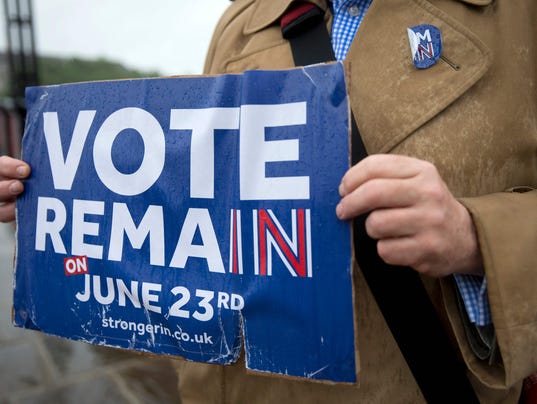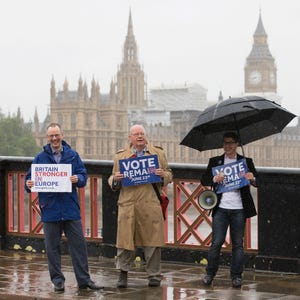The damn-the-torpedos allure of 'Brexit': David Andelman
It's all about taking back control, and it's got a lot in common with Trump's appeal in the U.S.
VENICE — "Brexit" might well be the end of the world as we know it.
That’s
certainly the view from this sun-washed Adriatic paradise in the south
of Europe and indeed on much of the rest of the continent of the choice
facing British voters. On Thursday, they will go to the polls to decide
whether to remain in the European Union or exit it, the first binding
stay-or-leave vote by a member nation since the creation of a single boundary-free continent more than three decades ago.
The
debate has taken on existential overtones on this side of the Atlantic,
and the powerful emotions it raises could well produce ripples that
affect America’s own future in the world. At its heart, Brexit is all
about the question of who’s ruling whom.
The
vote, Sergio Marchionne told me, is “about the exercise of power by
the protected over the unprotected.” The chairman of Fiat Chrysler and
one of Europe’s leading industrial figures, Marchionne is a firm
believer in a united Europe. But in so many ways, he said, it’s not
working. “What’s pulling Europe apart is the lack of intimacy between
the so-called ruling class of Europe and the people who are suffering
the consequences of their decision-making power. That needs to be
reconnected. If it doesn’t get reconnected, then I think the people are
going to question the wisdom of belonging to a club of which they have
no say in the rules and appears to be acting in an absolutely arbitrary
fashion in imposing fundamental choices about the way in which we live
across Europe.”
For
many, it’s an exciting process that suggests much of the appeal of
Donald Trump in the United States: a chance to take back the power that
people feel has been ceded, all but irrevocably, to rulers and
bureaucrats over whom they have no control.
“Trump is playing the national card,” Marchionne observed during a break in aworkshop sponsored
by the Council for the United States and Italy , which he chairs. “The
upside of the reacquired freedom from the machine is alluring. It says
you can control your own levers again, you can make your own choices,
you are not subject to what to some appears unjustified rulemaking
divorced from what happens in real life."
And
the fear is that this will start to look pretty good to other European
nations beyond Britain whose people are smarting under European-wide
regulations that are ill-controlled by their own national governments.
“We
are going to re-escalate all the trade barriers; we are going to
reinstall them; they are going to be used as comparative weapons,”
Marchionne warned. Gone will be any hope for the Transatlantic Trade and
Investment Partnership, an initiative dear to President Obama, designed
to broaden trade and lower tariffs between America and Europe.
To contain any damage from a Brexit, French officials are hellbent on severing Britainfrom
the continent as quickly and painfully as possible if the vote goes
against Europe. The hope is to contain the centrifugal forces from
spreading to the rest of the EU. The reality is that Europe is as much
in the grip of a populist upsurge as the United States — and with
potentially equally catastrophic results.
POLICING THE USA: A look at race, justice, media
Virtually
every major social, political and economic issue that is playing out on
both sides of the Atlantic is at the heart of the Brexit debate,
headlined by immigration. A Europe without boundaries means any Middle
East or North African immigrant who somehow manages to land in some
corner of Europe is theoretically free to travel, all but unchecked, to
every other corner — and as happened in Paris and Brussels , embark on
bloody terrorist mayhem.
Yet
many of Europe’s political leaders are even more panicked over the
potential threat to their hold on power. “If you look at the polls in
most countries, the appreciation of Europe has gone down, but the
appreciation of national governments is lower and gone down even
faster,” former Italian prime minister Mario Monti told the Council
for the United States and Italy.
This past weekend, French Socialists even approved a primary ballot to
choose the party’s candidate in next year’s presidential elections.
With incumbent Socialist President Francois Hollande ’s popularity
hovering between 11% and 15%, he no longer has, as he might in the USA, a
traditionally unchallenged path for his party’s designation to the
second term he so clearly covets.
David A. Andelman, a member of the USA TODAY Board of Contributors, is editor emeritus of World Policy Journal and author of A Shattered Peace: Versailles 1919 and the Price We Pay Today. Follow him on Twitter: @DavidAndelman
In addition to its own editorials, USA TODAY publishes diverse opinions from outside writers, including our Board of Contributors. To read more columns, go to the Opinion front page, follow us on Twitter @USATOpinion and sign up for our daily Opinion newsletter.



No comments:
Post a Comment